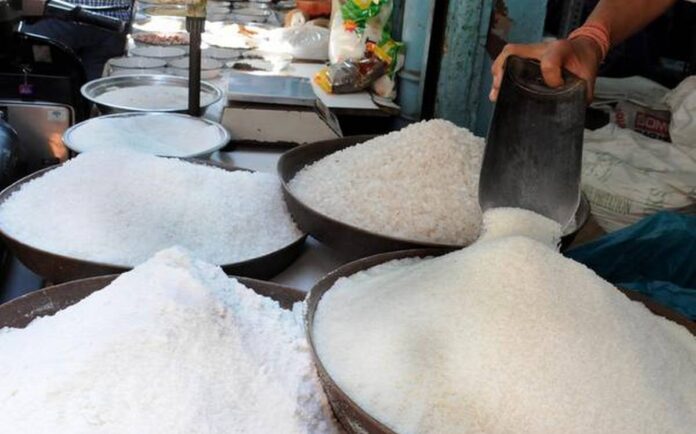ISLAMABAD, March 22: Despite Deputy Prime Minister Ishaq Dar’s recent statement capping sugar prices at Rs164 per kilogram, consumers continue to face high prices, with the average national price ranging from Rs164 to Rs180 per kg.
In Rawalpindi sugar price is Rs 178-180 per kg, even Peshawar even higher than that.
He is in Saudi Arabia, to perform Omara with Prime Minister delegation, which he went just after announcing the sugar prices. Prime Minister Shahbaz Sharif and Ishaq Dar met, higher officials of Saudi Arabia during their visit.
However, their orders are still waiting to see implementation.
Rauf Ibrahim, the President of the Karachi Wholesalers Grocers Association (KWGA), recalled that sugar wholesale prices in Karachi initially dropped to Rs158 per kg from Rs168 per kg following Prime Minister Shehbaz Sharif’s March 15 announcement of a crackdown on hoarders.
However, retailers failed to pass on the benefits of the Rs10 per kg drop, instead capitalizing on the high demand during Ramazan.
Ibrahim criticized the government’s inability to ensure that sugar is available for consumers at Rs130 per kg, and pointed out that no serious actions have been taken against sugar millers.
Dar Out of Country: Wholesale Price is Even Higher
He noted that only retailers have been targeted, while millers, who are in direct communication with the government, have seen wholesale sugar prices rise back to Rs168 per kg. Ibrahim has called for an investigation into the actual cost of sugar production.
A spokesperson from the Pakistan Sugar Mills Association (Punjab Zone) responded to these concerns, stating that some individuals continue to misinterpret the situation by linking sugar price hikes to exports.
The spokesperson emphasized that the price increase was not caused by sugar exports.
By the end of September 2024, Pakistan’s sugar industry was expected to have around 1.2 million tonnes of surplus sugar, valued at Rs250 billion, which was already pledged to banks at an interest rate of nearly 25%.
Dar Out of Country: Where Surplus Sugar
Without the export permission, the sugar industry—critical for import substitution worth $5 billion and producing the world’s cheapest sugar—would have collapsed.
The spokesperson clarified that exports were approved only after verifying surplus stock through multiple governmental checks.
Furthermore, in June 2024, the government and the sugar industry had mutually agreed that the ex-mill rate of sugar for the 2023-24 crushing season would remain at Rs140 per kg during the export period.
The spokesperson also pointed out that the cost of sugar production varies each season, particularly due to fluctuations in sugarcane prices.
This season, sugarcane growers were paid historically high rates, reaching up to Rs750 per maund, providing sustainability to both the growers and the agriculture sector and ensuring better prospects for future sugarcane crops.
Dar Out of Country: Millers or Hoarders Mafia
The spokesperson criticized media campaigns, hoarders, and market manipulators—commonly referred to as the “Satta Mafia”—for driving sugar prices higher and causing undue profits.
The sugar industry has long called for the appointment of independent cost auditors to verify the true cost of sugar production, making the process more reliable and transparent for all parties involved.
Moreover, the sugar industry has suggested implementing a two-tier pricing system to distinguish between the commercial sector, which consumes 80% of the sugar, and domestic consumers, who account for the remaining 20%.
The commercial sector is largely unregulated and not subject to any price controls. The industry has urged the government to create a support mechanism for domestic consumers in consultation with relevant stakeholders.









